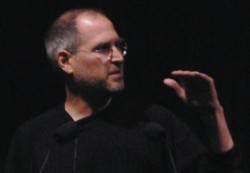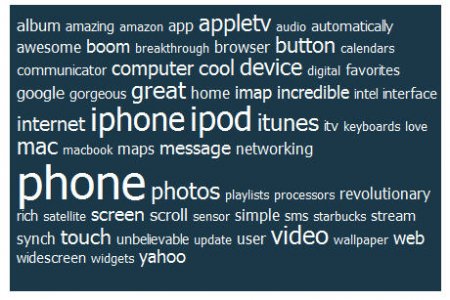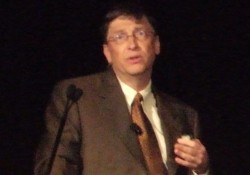Steve Jobs speaks more clearly than Bill Gates
Last week, Bill Gates and Steve Jobs almost simultaneously made great program speeches. Transcripts of these speeches are published on the Internet: both the speech of Gates and the speech of Jobs .
Technophile linguists decided to conduct an experiment and skip both texts through a tag generator . This is a program that displays on the screen a list of the most frequently used words from the text, while the words have different sizes, depending on their frequency. To make the analysis even more complete, the speech of Michael Dell, the head of Dell, was also studied.
After that, the texts were passed through the UsingEnglish.com semantic analysis program , which determines the key parameters of the texts: average number of words in a sentence, lexical density, proportion of difficult words and unreadability index ((average number of words in a sentence + percentage of words with three or more syllables) × 0.4). The smaller each of these parameters - the more understandable and accessible is the text. For example, the NY Times newspaper has an unreadability index of 11.
In the results of the experiment , the cardinal difference between Bill Gates and Steve Jobs is visible. Unlike Bill Gates, the head of Apple speaks with the shortest possible sentences, simple phrases and understandable words.
')

Steve Jobs, Macworld Conference and Expo 2007
The average number of words in the sentence: 10.5
Lexical density: 16.5%
Difficult words: 2.9%
Unreadability Index: 5.5
Video | Text

 Bill Gates, Consumer Electronics Show 2007
Bill Gates, Consumer Electronics Show 2007
The average number of words in the sentence: 21.6
Lexical density: 21.0%
Difficult words: 5.11%
Unreadability Index: 10.7
Video | Text


Michael Dell, Consumer Electronics Show 2007
Average number of words in a sentence: 16.5
Lexical density: 26.3%
Difficult words: 6.4%
Unreadability Index: 9.1
Video | Text

Technophile linguists decided to conduct an experiment and skip both texts through a tag generator . This is a program that displays on the screen a list of the most frequently used words from the text, while the words have different sizes, depending on their frequency. To make the analysis even more complete, the speech of Michael Dell, the head of Dell, was also studied.
After that, the texts were passed through the UsingEnglish.com semantic analysis program , which determines the key parameters of the texts: average number of words in a sentence, lexical density, proportion of difficult words and unreadability index ((average number of words in a sentence + percentage of words with three or more syllables) × 0.4). The smaller each of these parameters - the more understandable and accessible is the text. For example, the NY Times newspaper has an unreadability index of 11.
In the results of the experiment , the cardinal difference between Bill Gates and Steve Jobs is visible. Unlike Bill Gates, the head of Apple speaks with the shortest possible sentences, simple phrases and understandable words.
')

Steve Jobs, Macworld Conference and Expo 2007
The average number of words in the sentence: 10.5
Lexical density: 16.5%
Difficult words: 2.9%
Unreadability Index: 5.5
Video | Text

 Bill Gates, Consumer Electronics Show 2007
Bill Gates, Consumer Electronics Show 2007The average number of words in the sentence: 21.6
Lexical density: 21.0%
Difficult words: 5.11%
Unreadability Index: 10.7
Video | Text


Michael Dell, Consumer Electronics Show 2007
Average number of words in a sentence: 16.5
Lexical density: 26.3%
Difficult words: 6.4%
Unreadability Index: 9.1
Video | Text

Source: https://habr.com/ru/post/4953/
All Articles